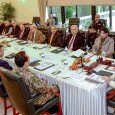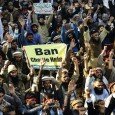By Sher Ali Khalti –
Despite bitter experiences linked with military courts of the past these courts are the necessity of the day to deliver speedy justice to terrorists
It was a freezing cold day of the last week of December 1970. A young boy was sitting in front of a major, a colonel and a session judge in a special military court. The court was set up in Adiyala Jail of Rawalpindi, right there in the room of the superintendent of the jail. The crime of the young boy was that he had made a speech against Martial Law Administrator General Yahya Khan at Lal Kurti Bazaar of Rawalpindi. There was no sign of repentance on his face and he did not plead for mercy. He was awarded a sentence of six years’ rigorous imprisonment by the military court.
It may come as a surprise for many people that he was none else than the sitting information minister Pervaiz Rashid. No one knew, as time passed, that one day he would himself justify his sentence and express confidence in the military courts that punished him for “speaking the truth.” Yes this is the same Pervaiz Rashid, who after 45 years of award of punishment has presented a draft in the assembly about a constitutional amendment. This amendment will pave way for the establishment of military courts all over the country.
The only difference, stated by supporters of the intended move, is that at that time the military courts targeted democratic struggle and took away the right of free speech from people but this time these are being established to deal with the menace of terrorism. It is also said that the lacunae in the criminal justice system and the reluctance of witnesses, lawyers etc. to appear against terrorists in courts have helped the accused. The life of judges hearing terrorism cases and punishing terrorists is also at stake.
Military courts have always been controversial. They were established for the first time in 1953 when first martial law was imposed in Lahore to curb the riots against Qadianis. Death sentences were awarded to Maulana Maudoodi of Jamaat-e-Islami, Maulana Abdul Sattar Niazi of Jamiat Ulma-e-Islam (JUI) and others. These sentences were criticized and condemned all over the world and the martial law administrator had to change them to life imprisonments.
In 1958, this was General Ayub Khan who established military courts. Many progressives and leftists were hanged on the orders of these courts. Nationalists were also taken to gallows as they had continued struggle for their rights. Sardar Nauroz Khan and his siblings were awarded death sentence by military courts. While the death sentence of Sardar Nauroz Khan was converted into life imprisonment viewing his old age, his sons and nephews were not spared and hanged. Nawab Akabar Khan Bugti was also awarded life imprisonment. His only crime was to raise voice in the favour of Baloch people. The inhabitants of East Pakistan, Sindh and Sarhad (now KPK) provinces were also the victims of military courts.
In 1969 General Yahya followed the footsteps of his predecessors and established military courts. Workers of Awami National Party, Pakistan People’s Party and Awami Leauge, and communists were tried by military courts. Thousands of workers of Awami Leagues were given sentence in 1972 by these courts. However, these military courts were abolished under the orders of Justice Hamood-ur-Rehman who was tasked with looking into reasons behind separation of East Pakistan and compiling a report on the basis of these findings.
In 1979, General Zia came into power by the virtue of another martial law. Military courts were set up all over the country. The purpose behind this move was that to crush millions of people who were demanding fundamental rights and striving for restoration of the constitution of 1973. Sentences were awarded on a large scale in Sindh in Zia’s regime by special military courts. Thousands of workers of Movement for Restoration of Democracy (MRD) including women had to face the wrath of Zia.
The solution to Karachi unrest and lawlessness was also sought through the establishment of military courts during the last regime of Nawaz Sharif. In 1999, the Supreme Court of Pakistan (SCP) under Chief Justice Ajmal Mian suspended these military courts. The SCP declared there was no space for parallel courts in the constitution of Pakistan.
Now Nawaz Sharif is once again in power and military courts are being established through an amendment in the constitution. Almost all the political parties are against military courts as they have been haunted by these in the past. They do not want to be victimized once again. An All Parties’ Conference (APC) was called to discuss the issue and all the political parties present there expressed their concerns. After sometimes they were convinced and assured that politicians, traders, media etc will not be tried in military courts.
Chaudhry Nisar has repeatedly stated that military courts will only hold trials of terrorists and country’s judicial system will continue to function. He has also tried to dispel the impression that the establishment of military courts means that the existing judicial system of the country is not delivering justice. “Pakistan is passing through an extraordinary situation and this situation demands extraordinary measures,” Nisar said.
He further explained in a press conference that Pakistan Army, police and security agencies would present terrorists before special courts where they would get an opportunity to defend themselves. “The special courts headed by army officers will also work under laws, rules and regulations,” he explained in a bid to dispel fears that these courts will witch hunt people just for having a different view.
Having discussed the history of military courts in details one comes to the situation on ground and the concerns of those who are likely to be affected. The latest situation is that (till the filing of this report) the government has introduced two bills in the National Assembly by visualizing 21st amendment to the Constitution of Pakistan. One is related to Pakistan Army Act, 1952, for speedy trial of terrorists mainly in the wake of a terrorists attack on Army Public School, Peshawar. Any person who is or claims or is known to belong to a terrorist group or organization using name of religion or sect and raises army or wages war against Pakistan or attacks the armed forces and law enforcement agencies or attacks any civil or military installations or kidnappings of any person for ransom or causes death to any person or injury shall be punished under amended Pakistan Army Act. The military courts would be established and have a tenure of two years.
Senator Taj Haidar, senior PPP leader, expressing his concerns on the establishment of military courts said: “their history is not good at all. There is no need of parallel courts. Civilian courts will be weakened in the presence of military courts. As civilian courts get weakened democracy also gets weekend.” Taj adds that Army also got weakened when parallel armed forces of militants were raised by the establishment. These militants spread havoc in the country and today no one is safe from the barbarism of the terrorists.
Taj says Taliban were given an opportunity to organize themselves while the negotiations were being done between them and government. “Taliban organized and weaponized themselves during the time space given to them in the name of negations. Actually Taliban is a corps of establishment. But when they attacked Army Public School, Peshawar, the establishment decided that they should be handled strictly as it was hard to control them like in the past.”
Taj questions that if the intelligence agencies know when the Taliban are going to attack a target, then why they do not arrest them in time. If people from intelligence agencies can be entered in Taliban groups to keep an eye on their activities, then strict action can also be done against them. “Extremists have their political wings also like PTI. Taliban are organized and concealed themselves in many cores,” he asserts.
General (retired) Hameed Gul has a totally different opinion. He told Pique that “military courts are a demand of time and justice. Our civilian courts have failed to provide justice. Judges are afraid of giving verdict against terrorists. There are many flaws in our law which is old and carved during the Anglo-Saxon age.” He says judiciary releases terrorists due to insufficient evidence and nonappearance of witnesses. “When a terrorist will come to a military court he will be punished within short span of time. The terrorist will be provided access to civilians lawyers so that he can defend himself,” he adds.
Responding a question, former ISI chief said that a major or a colonel will hear a case and it is wrong to say that no military officer knows the law. “Laws are taught during our training.” He rejects the claim of Taj Haider that democracy will be weakened due to the establishment of these courts. “Democracy will be strengthened if justice is done. Military courts are being set up on the request of democratic government. These are not being imposed by any one,” he adds.
When asked about the definition of terrorism and a terrorist, he says there existed confusion. Even the UN, which held a convention on this subject in 2003, failed to reach a consensus on the exact definition of terrorism.
He says 95 percent of the killers are released due to loopholes in law. He says “judges surrender as terrorists threaten them. But an army officer does not come under any pressure as he plays with danger all the time. It is a part of his training. I would again say that setting up of military courts is the only way to crush terrorism.’’
Syed Nisar Safdar, Advocate Lahore High Court condemns military courts out rightly. He says it would be ridiculous if someone says that judges surrender as they are threatened. “If judges are provided the same security and environment as provided to army officers they can give excellent judgments. Military must only secure borders and should not intervene in the civilian judicial system. Establishment of military courts is actually a sheer violation of human rights,” said Safdar said.
He questions that how can a military officer hear cases related with law without having any experience of understanding and practicing law. “Can lawyers secure country’s borders? If the answer is no then how can a military office hear a case and give a verdict” he questions. Safdar says the attack on Army Public School is not a failure of judiciary. “It is a failure of army and intelligence agencies,’’ he comments.
Babar Ghauri, central leader of MQM, tells Pique that the “government has assured that only the terrorists will be tried in military courts and no political leader or other civilian would be tried in these special courts. He suggests that the military and the law enforcers shall keep an eye on madrassas which in his opinion are the breeding grounds of terrorists and extremists.
“We had reservations on the establishment of military courts due to our past experiences with them. However, we accepted them in the best interest of the country,” Mr Ghauri said






























































































